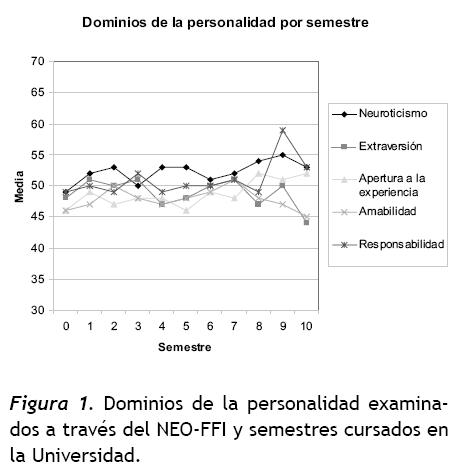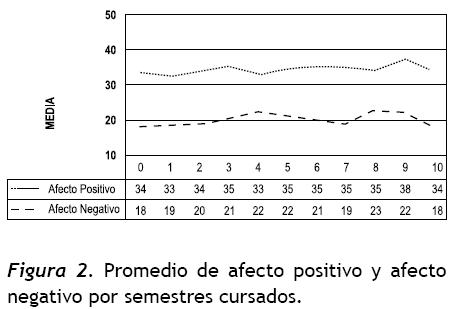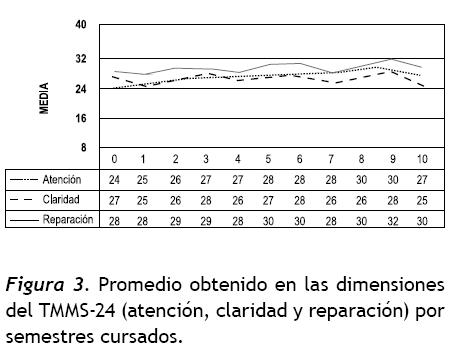Personalidad, inteligencia emocional y afectividad en estudiantes universitarios de áreas empresariales Implicaciones para la formación de líderes
Personality, emotional intelligence and affectivity in college students of business areas Implications for the training of leaders
Resumen (es)
El propósito de este estudio fue describir la personalidad, el afecto y la inteligencia emocional a lo largo de la formación profesional, en 422 estudiantes de áreas empresariales. Se utilizó el Inventario de Personalidad NEO-FFI de Costa & McCrae (1994), el TMMS-24 (adaptado por Fernández-Berrocal, Extremera & Ramos, 2004) y el PANAS (adaptado por Sandín et al., 1999). Se encontraron niveles altos de neuroticismo y bajos de extraversión, apertura a la experiencia y amabilidad; niveles intermedios de inteligencia emocional y una afectividad positiva predominante. El neuroticismo se incrementó en algunos semestres, la apertura a la experiencia y la responsabilidad aunque presentan niveles bajos, tienden a incrementarse durante la formación. Los participantes se caracterizaron por su afectividad positiva, la cual no parece depender de los procesos formativos sino de sus características personales. Se discuten estos hallazgos en relación con la formación de líderes empresariales.
Resumen (en)
The purpose of this study was to describe the personality, the affect and the emotional intelligence of 422 business students throughout their training process. The Personality Inventory NEO-FFI of Costa & McCrae (1994), the Spanish versions of TMMS-24 (adapted by Fernández-Berrocal, Extremera, & Ramos, 2004) and the PANAS (adapted by Sandín et al., 1999), were used. We found high levels of Neuroticism and low levels of Extraversion, Openness to Experience and Agreeableness; Emotional Intelligence achieved intermediate levels, and a predominant positive affectivity. The neuroticism was increased in some semesters, the Openness to Experience and Conscientiousness although all of them had low levels, tended to increase during the formation. The participants are characterized by positive emotions, which does not seem to depend on the formation processes but their personal characteristics. These findings are discussed in relation to the training of business leaders.
Referencias
Avia, M.D. & Sánchez, M.L. (1995). Personalidad: aspectos cognitivos y sociales. Madrid: Pirámide.
Bermúdez, M, P., Álvarez, I. T. & Sánchez, A. (2003). Análisis de la relación entre inteligencia emocional, estabilidad emocional y bienestar psicológico. Universytas Psychologica, 2 (1), 27-32.
Carver, C.S. & Scheier, M.F. (2001). Optimism, Pesimism, and self-regulation. En E.C. Chang (Ed.). Optimism and pessimism. Implications for theory research and practice. (pp. 31-51). Washington, D.C.: American Psychological Association.
Chico, E. & Ferrando, P.J. (2008). Variables cognitivas y afectivas como predictoras de satisfacción en la vida. Psicothema, 20 (3), 408-412.
Ciarrochi, J. V., Chan, A. & Caputi, P. (2000). A critical evaluation of the emotional intelligence construct. Personality and Individual Differences, 28, 539-561.
Contreras, F.V. (2008). Liderazgo: perspectivas de desarrollo e investigación. International Journal of Psychological Research, 1 (2), 64-72.
Costa, P. T. & McCrae, R. R. (1992). Revised NEO Personality Inventory [NEO-PI-R]. and NEO Five-Factor Inventory [NEO-FFI]: professional manual. Odessa, FL: Psychological Assessment Resources.
Costa, P. T. & McCrae, R. R. (1994). The Revised NEO Personality Inventory: Manual Supplement for the Spanish Edition. Odessa, FL: Psychological Assessment Resources.
Davies, M., Stankov, L. & Roberts, R. D. (1998). Emotional intelligence: In search of an lusive construct. Journal of Personality and Social Psychology, 75, 989-1015.
Dulewicz, V. & Higgs, M.J. (1998). Emotional Intelligence: can it be measured reliably and validly using competency data? Competency, 6 (1), 28-37.
Elliot, A. J. & Thrash, T. M. (2002). Approachavoidance motivation in personality: approach and avoidance temperaments and goals. Journal of Personality and Social Psychology, 82 (5), 804-818.
Extremera, N. & Fernández-Berrocal, P. (2005). Perceived emotional intelligence and life satisfaction: Predictive and incremental validity using the Trait Meta-Mood Scale. Personality and Individual Differences, 39, 937-948.
Fernández-Berrocal, P. & Extremera, N. (2006). Emotional intelligence and emotional reactivity and recovery in laboratory context. Psicothema, 18 (supl.), 72-78.
Fernández-Berrocal, P., Extremera, N. & Palomera, R. (2008) Emotional Intelligence as a crucial mental ability on educational context. En A. Valle & J. C. Núñez (Eds.). Handbook of Instructional Resources and their applications in the classroom (pp. 67-88). New York: Nova Science Publishers, Inc.
Fernández-Berrocal, P., Extremera, N. & Ramos, N. (2004). Validity and reliability of the Spanish modified version of the Trait Meta-Mood Scale. Psychological reports, 94, 751-755.
Fernández-Berrocal, P., Ramos, N. & Extremera, N. (2001). Inteligencia emocional, supresión crónica de pensamientos y ajuste psicológico. Boletín de Psicología, 70, 79-95.
Fernández-Berrocal, P., Salovey, P., Vera, A., Extremera, N. & Ramos, N. (2005). Cultural influences on the relation between perceived emotional intelligence and depression. International Review of Social Psychology, 18, 91-107.
Gohm, C. L. & Clore, G. L. (2000). Individual differences in emotional experience: Mapping scales to processes. Personality and Social Psychology Bulletin, 26, 679-697.
Goleman, G. (1995). Emotional Intelligence. Nueva York: Bantam.
Gullone, E. & Moore, S. (2000). Adolescent risktaking and the five-factor model of personality. Journal of Adolescence,23 (4), 393-407.
Johnson, P. R. & Indvik, J. (1999). Organizational benefits of having emotionally intelligent managers and employees. Journal of workplace learning, 11, 84-88.
Lopes, P.N., Brackett, M.A., Nezlek, J.B., Schütz, A., Sellin, I. & Salovey, P. (2004). Emotional intelligence and social interaction. Personality and Social Psychology Bulletin, 30, 1018-1034.
Lopes, P.N., Salovey, P., Cote, S. & Beers, M. (2005). Emotion regulation abilities and the quality of social interaction. Emotion, 5, 113-118.
Malouff, J. M., Thorsteinsson, E. B. & Schutte, N. S. (2006). The five-factor model of personality and smoking: A meta-analysis. Journal of Drug Education, 36, 47-58.
Markey, C. N., Markey, P. M., Ericksen, A. J. & Tinsley, B. J. (2006). Children's behavioral patterns, the five factor model of personality, and risk behaviors. Personality and Individual Differences, 41, 1503-1513.
Martínez-Pons, M. (1997). The relation of emocional intelligence with selected areas of personal functioning. Imagination, Cognition and Personality, 17, 3-13.
Mayer, J. D. & Salovey, P. (1997). What is emotional intelligence? En P. Salovey & D. Sluyter (Eds.). Emotional Development and Emotional Intelligence: Implications for Educators (pp. 3-31). New York: Basic Books.
Mayer, J.D., Salovey, P. & Caruso, D.R. (2004). Emotional Intelligence: Theory, Findings, and implications. Psychological Inquiry, 15 (3), 197-215.
Mc Elroy, T. & Dowd, K. (2007). Susceptibility to anchoring effects: How openness to experience influences responses to anchoring cues. Judgment and Decision Making, 2, 48-53.
Nicholson, N., Fenton-O'Creevy, M., Soane, E. & Willman, P. (2005). Personality and Domain Specific Risk Taking. Journal of Risk Research, 8 (2), 157-176.
Ones, D. S., Dilchert, S., Viswesvaran, C. & Judge, T. A. (2007). In support of personality assessment in organizational settings. Personnel Psychology, 60, 995-1027.
Pennebaker, J. W. (1997). Writing about emotional experiences as a therapeutic process. Psychological Science, 8 (3), 162-166.
Petrides, K. V. & Furnham, A. (2000). Gender differences in measured and self-estimated trait Emotional Intelligence. Sex Roles, 42, 449-461.
Ramos, N. S., Fernández-Berrocal, P. & Extremera, N. (2007). Perceived emotional intelligence facilitates cognitive-emotional processes of adaptation to an acute stressor. Cognition & Emotion, 21 (4), 758-772.
Salovey, P. & Mayer, J. (1990). Emotional Intelligence. Imagination, Cognition and Personality, 9, 185-211.
Salovey, P., Mayer, J., Goldman, S. L., Turvey, C. & Palfai, T. P. (1995). Emotional attention, Clarity, and Repair: Exploring emotional intelligence using the Trait Meta-Mood Scale. En J.W. Pennebaker (Ed.). Emotion, disclosure, & health (pp. 125-154). Washington, D. C.: American Psychological Association.
Sandín, B., Chorot, P., Lostao, L., Joiner, T.E., Santed, M.A. & Valiente, R.M. (1999). Escala PANAS de afecto positivo y negativo: Validación factorial y convergencia transcultural. Psicothema, 11 (1), 37-51.
Vera-Villarroel, P. & Guerrero, A. (2003). Diferencias en habilidades de resolución de problemas sociales en sujetos optimistas y pesimistas. Universitas Psychologica, 2 (1), 21-26.
Watson, D. & Tellegen, A. (1985). Toward a consensual structure of mood. Psychological Bulletin, 98, 219-235.
Watson, D. & Clark, L.A. (1984). Negative affectivity: The disposition to experience aversive emotional states. Psychological Bulletin, 96, 465-490.
Watson, D., Clark, L. A. & Tellegen, A. (1988). Development and validation of brief measures of positive and negative affect: The PANAS scales. Journal of Personality and Social Psychology, 54, 1063-1070.
Cómo citar
Personalidad, inteligencia emocional y afectividad
en estudiantes universitarios de áreas empresariales
Implicaciones para la formación de líderes*
Personality, emotional intelligence and affectivity
in college students of business areas
Implications for the training of leaders
Françoise Contreras1 **, David Barbosa1, Juan Carlos Espinosa2
* Artículo de investigación. Grupo de Investigación en Perdurabilidad Empresarial (GIPE) del Centro de Estudios para la Perdurabilidad Empresarial (CEEP), Universidad del Rosario. Grupo de Investigación Psicología, Salud y Calidad de Vida. Universidad Santo Tomás.
1 Universidad del Rosario, Colombia
2 Universidad Santo Tomás, Colombia
Recibido: 22 de septiembre de 2009 Revisado: 5 de noviembre de 2009 Aceptado: 18 de enero de 2010
Resumen
El propósito de este estudio fue describir la personalidad, el afecto y la inteligencia emocional a lo largo de la formación profesional, en 422 estudiantes de áreas empresariales. Se utilizó el Inventario de Personalidad NEO-FFI de Costa & McCrae (1994), el TMMS-24 (adaptado por Fernández-Berrocal, Extremera & Ramos, 2004) y el PANAS (adaptado por Sandín et al., 1999). Se encontraron niveles altos de neuroticismo y bajos de extraversión, apertura a la experiencia y amabilidad; niveles intermedios de inteligencia emocional y una afectividad positiva predominante. El neuroticismo se incrementó en algunos semestres, la apertura a la experiencia y la responsabilidad aunque presentan niveles bajos, tienden a incrementarse durante la formación. Los participantes se caracterizaron por su afectividad positiva, la cual no parece depender de los procesos formativos sino de sus características personales. Se discuten estos hallazgos en relación con la formación de líderes empresariales.
Palabras clave: liderazgo, personalidad, afecto positivo y negativo, inteligencia emocional.
Abstratc
The purpose of this study was to describe the personality, the affect and the emotional intelligence of 422 business students throughout their training process. The Personality Inventory NEO-FFI of Costa & McCrae (1994), the Spanish versions of TMMS-24 (adapted by Fernández-Berrocal, Extremera, & Ramos, 2004) and the PANAS (adapted by Sandín et al., 1999), were used. We found high levels of Neuroticism and low levels of Extraversion, Openness to Experience and Agreeableness; Emotional Intelligence achieved intermediate levels, and a predominant positive affectivity. The neuroticism was increased in some semesters, the Openness to Experience and Conscientiousness although all of them had low levels, tended to increase during the formation. The participants are characterized by positive emotions, which does not seem to depend on the formation processes but their personal characteristics. These findings are discussed in relation to the training of business leaders.
Key words: leadership, personality, positive affect, negative affect, emotional intelligence.
Introducción
El liderazgo es un fenómeno altamente complejo, en el que se interrelacionan variables, tanto del sujeto como del contexto, de la situación y de los colaboradores, entre muchas otras. Desde la perspectiva del sujeto existe evidencia sobre la presencia de ciertas diferencias individuales que caracterizan a los líderes, entre ellas, rasgos de personalidad, afectividad y manejo de recursos emocionales. El propósito de este estudio es observar si dichas características están presentes en los estudiantes de áreas empresariales y si éstas varían en razón del tiempo de permanencia en la universidad. Los resultados de este estudio tendrán implicaciones para la formación de estudiantes de estas áreas, dado que se asume que en una medida importante estos aspectos psicológicos son susceptibles de ser modificados.
El estudio de la personalidad del líder constituyó una de sus primeras aproximaciones teóricas, y estuvo centrada principalmente en la teoría de los rasgos. Luego de un importante debate académico sobre la utilidad o no de estudiar la personalidad del líder, se asume que, hay suficiente evidencia para concluir que las variables de personalidad pueden llegar a predecir el liderazgo (Ones, Dilchert, Viswesvaran & Judge, 2007) al presentarse con otras características, como el comportamiento ciudadano en las organizaciones, la satisfacción laboral, la capacidad para cualificarse, la creatividad, la satisfacción con la vida, la toma de decisiones y el desempeño laboral entre otros (Malouff, Thorsteinsson & Schutte, 2006). Asimismo, existe amplio consenso en torno a la idea de que el liderazgo no es innato ni es un don exclusivo de ciertos individuos, sino por el contrario, es susceptible de ser aprendido. Se parte de la premisa fundamental de que el liderazgo es una condición humana y, como tal, estas diferencias individuales (personalidad) se potencian o inhiben de acuerdo con las oportunidades que brinda el ambiente en una relación sistémica permanente (Contreras, 2008).
Una de las taxonomías de personalidad más utilizadas en el ámbito organizacional es el modelo de los Cinco Factores o rasgos de personalidad de Costa & McCrae, (1992). Este Modelo ha tenido importantes avances metodológicos y conceptuales para la comprensión de la personalidad del líder. De acuerdo con el modelo, la extraversión (personas abiertas, activas y enérgicas con buenas relaciones interpersonales) y la apertura a la experiencia (búsqueda y valoración activa de la experiencia, tolerancia y exploración de lo desconocido) motiva a correr riesgos, mientras que el neuroticismo (individuos propensos al sufrimiento psicológico, ideas no realistas, respuestas de afrontamiento no adaptativas), los inhibe (Nicholson, Fenton-O'Creevy, Soane & Willman, 2005). Otros estudios hallaron que la extraversión, la apertura a la experiencia, la agradabilidad y la responsabilidad predicen el juicio en la toma de decisiones y la propensión a correr riesgos en una variedad de situaciones en contextos empresariales (Gullone & Moore, 2000; Markey, Markey, Ericksen & Tinsley, 2006), probablemente debido a la confianza que tienen estas personas en sí mismas y la sensibilidad particular que desarrollan para observar la información que provee el ambiente (Mc Elroy & Down, 2007).
Asimismo, Elliot & Thrash (2002) encontraron que ciertos rasgos de personalidad como la extraversión unido a una emocionalidad positiva y a una activación conductual se asocian con un temperamento aproximativo, mientras que aquellas personas que puntúan alto en neuroticismo, emocionalidad negativa e inhibición conductual poseen un temperamento evitativo. De manera coherente, el temperamento aproximativo ha mostrado estar sistemáticamente vinculado al logro de metas, característica fundamental de los líderes.
Los rasgos de personalidad también se han relacionado con lo que se ha llamado inteligencia emocional. Ciarrochi, Chan & Caputi, (2000) y Martínez-Pons, (1997) encontraron relaciones entre ésta y ciertas variables de personalidad, como la empatía, extraversión y apertura a la experiencia. Mayer, Salovey & Caruso, (2004) por su parte, hallaron correlaciones significativas de la inteligencia emocional con agradabilidad, apertura a la experiencia y responsabilidad.
Aunque el constructo de inteligencia emocional ha recibido fuertes críticas de la comunidad académica debido a la insuficiente evidencia empírica que lo sustenta, (Bermúdez, Álvarez & Sánchez, 2003), recientemente se han hecho importantes aportes a nivel teórico y conceptual, y se han depurado y aplicado modelos que dan cuenta de las características del constructo y su aplicación en distintos ámbitos de desarrollo en una variedad importante de contextos. A nivel empresarial, en particular, la inteligencia emocional se ha relacionado con el talento para las negociaciones (Petrides & Furnham, 2000), con el control emocional, automotivación, empatía, habilidad comunicativa y calidad de las relaciones interpersonales (Dulewicz & Higgs, 1998; Lopes et al., 2004), aspecto este de gran importancia en el ejercicio del liderazgo y la capacidad de adaptación. Los líderes con alta inteligencia emocional desarrollan una especial capacidad para adaptarse al medio, así como para expresar, percibir y conocer sus emociones y regular sus estados de ánimo, garantizando un mayor ajuste emocional (Fernández-Berrocal, Ramos & Extremera, 2001).
Las personas con alto nivel de inteligencia emocional son personas persistentes, empáticas, que mantienen la motivación propia y la del grupo a pesar de las dificultades, son estables emocionalmente, aceptan favorablemente las críticas, son flexibles en sus posturas, tienen en cuenta la opinión de otros, se adaptan mejor a situaciones de incertidumbre y toleran mejor la frustración, ya que son capaces de hacer un uso adecuado de sus recursos emocionales, incluso ante situaciones adversas, de las que suelen derivar un aprendizaje (Bermúdez et al., 2003; Goleman, 1995; Johnson & Indvik, 1999).
Las anteriores características hacen referencia a habilidades de las personas, por ello, en esta investigación se ha asumido la inteligencia emocional desde la perspectiva de habilidad y no de rasgo, siguiendo las orientaciones de algunos autores que consideran que ésta no puede ser entendida como un rasgo de personalidad o como parte del carácter de la persona (Fernández-Berrocal, Extremera & Palomera, 2008). Desde esta perspectiva, el modelo de Salovey & Mayer (1990) plantea que las habilidades emocionales pueden ser desarrolladas a través del aprendizaje y la experiencia cotidiana, (Fernández- Berrocal, Salovey, Vera, Extremera & Ramos, 2005; Mayer et al., 2004), lo cual ofrece importantes alternativas de desarrollo en la formación de líderes empresariales.
El modelo de Salovey & Mayer (1990) comprende la evaluación y expresión de emociones, su regulación y utilización en el pensamiento y la acción. Dicho modelo sostiene que las creencias acerca de nuestras propias habilidades emocionales o inteligencia emocional percibida se hacen más evidentes bajo condiciones de estrés y afrontamiento cuando los individuos son forzados a responder a emociones generadas por eventos externos (Ramos, Fernández-Berrocal & Extremera, 2007), lo cual es muy relevante en los directivos que se ven enfrentados continuamente a una serie de situaciones en las cuales se debe actuar en forma eficiente y eficaz.
Dentro del contexto de este modelo se desarrolló el TMMS, instrumento que estima las creencias que tienen las personas respecto a la atención sobre sus propias emociones (atención), claridad (comprensión) y reparación emocional (regulación). Estas subescalas han mostrado correlaciones moderadas con personalidad, principalmente con extraversión y neuroticismo (Extremera & Fernández-Berrocal, 2005). Con respecto al afecto, altos puntajes de claridad y reparación emocional han sido asociados inversamente con los síntomas de ansiedad y depresión (Fernández-Berrocal et al., 2005).
Aunque desde esta perspectiva la inteligencia emocional es entendida como una habilidad, se acepta que ésta opera sobre y con información emocional (Mayer et al., 2004), lo que ha mostrado relación con el ajuste psicológico de las personas. Algunos estudios han encontrado que estados emocionales negativos que indican un mal ajuste, como la depresión y la ansiedad, correlacionan de manera inversa con la inteligencia emocional (Davies, Stankov & Roberts, 1998; Fernández-Berrocal et al., 2005:), particularmente, la inhibición emocional o dificultad para expresar las emociones propias de manera abierta ha probado ser un indicador fiable de deficiente ajuste psicológico (Pennebaker, 1997). Coherentemente, los individuos con mayor puntuación de inteligencia emocional suelen tener menos dificultades para expresar abiertamente sus emociones (Davies etal., 1998; Gohm & Clore, 2000).
Lo anterior lleva a indagar sobre el afecto como base e insumo de la inteligencia emocional. Es claro que el afecto positivo y negativo guardan importante relación con la cognición como determinantes del comportamiento y el ajuste psicológico. En este estudio se evalúan las dos dimensiones claramente distinguibles del afecto, estudiadas hace más de dos décadas por Watson & Clark (1984) y Watson & Tellegen (1985) llamadas afectividad positiva y afectividad negativa. Se trata de dos dimensiones distintas e independientes (Chico & Ferrando, 2008; Sandín et al., 1999; Watson & Tellegen, 1985), es decir, la reducción en una de ellas, no necesariamente implica un aumento de la otra (Avia & Sánchez, 1995). Sandín et al. (1999) sostienen que es importante considerar que no se trata de dos aspectos opuestos del mismo fenómeno, y que su estructura bidimensional emerge independientemente del país y la cultura, lo que denotaría una significativa invarianza factorial transcultural.
Se ha encontrado que la inteligencia emocional permite reducir la intensidad y la frecuencia de emociones negativas causadas por los eventos adversos de la vida cotidiana (Fernández-Berrocal &Extremera, 2006), constituyéndose en un factor protector que hace a los sujetos menos vulnerables a problemas relacionados con la afectividad como la depresión (Fernández-Berrocal et al., 2008).
La afectividad positiva supone una predisposición relativamente estable a experimentar emociones favorables, acompañadas de una sensación de bienestar personal y social, caracterizado por una sensación de energía y entusiasmo y un compromiso agradable con el entorno, mientras que un bajo nivel de afectividad positiva refleja fatiga, cansancio mental y físico. La afectividad negativa supone una amplia predisposición a experimentar emociones desfavorables, constituye un factor de distrés subjetivo caracterizado por la presencia de estados de ansiedad, miedo, hostilidad y disgusto. Como podría esperarse, el afecto negativo y positivo guarda relación con rasgos tales como el neuroticismo y la extraversión respectivamente (Sandín et al., 1999).
Las personas que poseen un afecto positivo, suelen ser optimistas, lo cual se ha relacionado con la persistencia, la resolución adecuada de problemas, y la exitosa atención de demandas del ambiente y la determinación de las personas en dirigir sus metas (Carver & Scheier, 2001; Vera-Villarroel & Guerrero, 2003), esta convicción puede favorecer en los líderes el emprender grandes proyectos y asumir los riesgos que ello conlleva. Las creencias optimistas suelen a su vez relacionarse con mayor bienestar psicológico y satisfacción con la vida (Extremera & Fernández-Berrocal, 2005) y con la calidad de las relaciones que las personas establecen con los demás.
Los individuos capaces de manejar sus emociones presentan menores emociones negativas y facilitan las positivas (Bermúdez et al., 2003; Ciarrochi et al., 2000); son personas más amistosas y con mayor sensibilidad a las relaciones interpersonales que suelen tener comportamientos prosociales (Lopes et al, 2004; Lopes, Salovey, Cóté & Beers, 2005). Son personas que pueden percibir, entender y regular no sólo sus estados emocionales, sino que también aprecian, entienden y tratan los sentimientos y emociones ajenas (Mayer & Salovey, 1997).
Estudios han demostrado que la inteligencia emocional está relacionada directamente con emociones positivas tales como, la satisfacción con la vida (Extremera & Fernández-Berrocal, 2005) y que la identificación de las emociones propias y ajenas, su entendimiento y respuesta eficiente acerca de la información que ellas proveen sobre nosotros mismos y el ambiente pueden promover bienestar personal (Fernández-Berrocal et al., 2008).
Finalmente, y atendiendo las recomendaciones de varios autores acerca de la investigación en el área, el propósito de este estudio es describir la personalidad, la tendencia afectiva y la inteligencia emocional en estudiantes de áreas empresariales y observar si éstas presentan variación a lo largo de la formación profesional. Dentro de la línea de investigación, la importancia de continuar estudiando las diferencias individuales del líder radica, por una parte, en la identificación de individuos que por sus características de personalidad, se presume, poseen cierta disposición para ejercer liderazgo y, por otra, en la intervención eficaz sobre las variables cognitivas que se vinculan a estos rasgos para potenciarlas en las personas, a partir de sus fortalezas (Contreras, 2008), lo cual configura un importante campo de intervención en la formación de líderes empresariales.
Metodología
Participantes
La muestra, obtenida a través de un muestreo aleatorio estratificado, estuvo conformada por 422 estudiantes universitarios de áreas empresariales, de ambos sexos, de todos los semestres, con edades comprendidas entre los 16 y 26 años.
Instrumentos
Inventario de Personalidad [NEO-FFI]: se utilizó la versión reducida del Inventario de Personalidad NEO de Costa & McCrae (1994), el cual ha demostrado adecuadas propiedades psicométricas en varios estudios con diversas poblaciones. Consta de 60 ítems para examinar cinco grandes dominios de la personalidad:
1) Neuroticismo [N]: evalúa la Estabilidad vs. Inestabilidad Emocional. Identifica a los individuos propensos a sufrimiento psicológico, ideas no realistas, urgencias excesivas y respuestas de afrontamiento no adaptativas.
2) Extraversión [E]: evalúa la cantidad e intensidad de la interacción entre personas, el nivel de actividad, necesidad de estímulos y capacidad de disfrute.
3) Apertura a la Experiencia [O]: evalúa la búsqueda y valoración activa de la experiencia en sí misma, examinando la tolerancia y exploración de lo desconocido.
4) Amabilidad [A]: valora la cualidad de la propia orientación interpersonal a lo largo de un continuo desde la compasión a la rivalidad de pensamientos, sentimientos y acciones.
5) Responsabilidad [C]: valora el grado de organización del individuo, la perseverancia y la motivación en la conducta dirigida a un objetivo.
Inventario de afectividad positiva y negativa [PANAS]: para evaluar la afectividad positiva y negativa se utilizó la versión española del inventario PANAS [Positive And Negative Affect Schedulé] (Sandín etal., 1999), originalmente desarrollado por Watson, Clark & Tellegen (1988). Este inventario consta de 20 adjetivos que describen sentimientos y emociones. La mitad de ellos miden afectividad positiva y la otra mitad, afectividad negativa. Cada grupo de descriptores se suma de forma separada dando lugar a la puntuación de las dos escalas. A cada sujeto se le pide que evalúe cada uno de los grupos sobre una escala tipo Likert con un rango de 1 (nada o casi nada) hasta 5 (muchísimo) para expresar el grado en que se experimenta, habitualmente, el sentimiento o la emoción. Las escalas han demostrado un nivel de confiabilidad alfa de 0.88 y 0.87 para afectividad positiva y negativa respectivamente (Watson et al., 1988). En la versión española, se reformularon los ítems que presentaron menor grado de validez.
Trait Meta-Mood Scale [TMMS-24]: se utilizó la versión en español (Fernández-Berrocal et al., 2004), de la escala original desarrollada por Salovey, Mayer, Goldman, Turvey & Palfai (1995). La escala compuesta por 24 ítems ha demostrado alta consistencia interna (cada una de las subescalas tuvo un alpha de Cronbach por encima de 0.85), buena validez convergente y discriminante y confiabilidad satisfactoria test-retest (Salovey et al., 1995). Las tres dimensiones de la experiencia emocional que estima el instrumento hacen referencia a la habilidad percibida para: 1) atender los estados de ánimo y emociones (atención), 2) discriminar claramente entre sus emociones (claridad) y 3) regular estados emocionales (reparación).
Procedimiento
Previa autorización de las directivas de la Universidad, se inicio la aplicación de los tres instrumentos descritos. Se informó a los estudiantes acerca de los objetivos de la investigación, se les solicitó su consentimiento, y se les garantizó la confidencialidad de la información obtenida; se les aclaró también que no obtendrían remuneración alguna por su participación, y que podrían desistir de participar en el estudio, en el momento en que lo desearan. Se hicieron aplicaciones colectivas por grupos de alrededor de 20 personas. Cada aplicación duró aproximadamente 45 minutos por grupo.
Resultados
A nivel sociodemográfico, la muestra estuvo conformada por 422 estudiantes de ambos sexos, con un porcentaje mayor de mujeres (55%), y edades comprendidas entre los 16 y 26 años, con un promedio de edad de 19.62 (dt. 1.69), sin diferencias estadísticamente significativas por sexo [t(401) = 1.21; Sig. = .227]. Respecto al nivel socioeconómico se encontró una preponderancia de la clase media-alta, (estrato 4 con 41.5% y estrato 5 con 21.1%); los estratos 3 y 6 representaron participaciones similares, 15.2% y 14.7% respectivamente, mientras que 7.6% de los participantes no reportaron esta información. En la Tabla 1 puede observarse la distribución de la muestra por semestre.
A continuación se presenta la descripción de las variables incluidas en el estudio, personalidad, inteligencia emocional y afectividad.
Personalidad
El promedio de los participantes en cada uno de los dominios de personalidad se presenta en puntaje estandarizado con baremos colombianos de media 50 y dt 10. En la Tabla 2 se observa que los participantes, en relación con la población general, presentan diferencias estadísticamente significativas en neuroticismo, extraversión, apertura a la experiencia y amabilidad, mientras que en el dominio responsabilidad tuvieron un promedio similar al de la población general. Sin embargo, estas diferencias no son clínicamente significativas, pues son menores a V de desviación típica de la media de referencia.
Al examinar las diferencias de sexo en los dominios del NEO-FFI se encontró que, con excepción de la extraversión, en todos los casos las mujeres que participaron en el estudio (n=231) presentan mayor magnitud de atributo que los hombres (n=170). Tal como se evidencia en otros estudios, las mujeres presentan puntuaciones significativamente mayores que los hombres en neuroticismo, amabilidad y responsabilidad; no obstante, en esta oportunidad tales diferencias se evidencian también en apertura a la experiencia, aunque es importante tener en cuenta que las puntuaciones en todos los casos se mantienen dentro del rango de normalidad (Tabla 3).
El nivel socioeconómico también fue examinado como posible modulador de los dominios de personalidad; al respecto se encontró que en extraversión y apertura a la experiencia, las diferencias son estadísticamente significativas (Tabla 4). En el dominio extraversión las diferencias se producen entre los estratos 3 y 4, mientras que en el factor apertura las diferencias se presentan entre el estrato 6 y los demás.
Por otro lado, al examinar la asociación entre los dominios de personalidad y la antigüedad en el programa académico (Figura 1) se encontraron asociaciones bajas, positivas y significativas con Neuroticismo (r = .12 Sig.= .014), Apertura a la Experiencia (r = .11 Sig.= .025) y Responsabilidad (r = .14 Sig.= .006); respecto a este último dominio también se hallaron diferencias entre los distintos grupos por antigüedad [F(10;409) = 2.58 Sig. = .005], en el cual los estudiantes que tienen 9 semestres de antigüedad en el programa se diferencian de los demás, con excepción de los que reportaron 10 semestres de antigüedad. En la (Figura 1) puede observarse la puntuación media en los dominios de la personalidad, por cada semestre cursado.
Afecto positivo y negativo
Respecto a la afectividad positiva y negativa estimada a través del Test PANAS, el análisis descriptivo reveló que el afecto positivo presentó el máximo puntaje de la escala (50 puntos) a diferencia del afecto negativo donde el máximo puntaje se ubicó en 44 puntos; los valores mínimos también presentan diferencias entre afecto positivo y negativo, siendo menor para este último (Tabla 5).
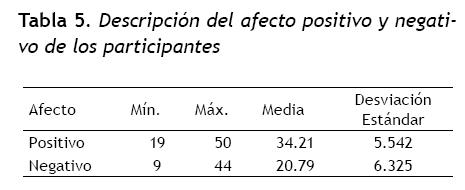
El análisis global, indica que los participantes tienen una tendencia estadísticamente significativa hacia el afecto positivo [t(421) = 32.37; Sig. = .000], que no es explicada por diferencias ni de sexo (Tabla 6). ni de nivel socio-económico (Tabla 7). y tampoco se encuentran asociadas a la edad de los participantes; en esta última variable se obtuvo un r = .057 y r = .042 para afecto positivo y negativo respectivamente.
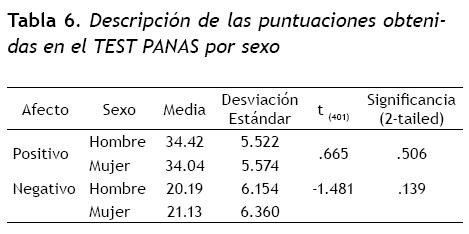
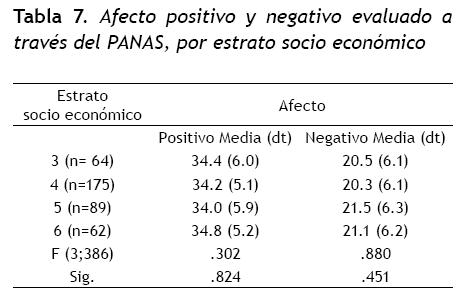
No obstante, al examinar la asociación entre la afectividad y la antigüedad en el programa académico, estimada en semestres, se encontraron correlaciones bajas pero significativas entre estas variables (r = 107 Sig. = .028 para afecto positivo y r = .127 Sig. = .009 para afecto negativo), indicando una mayor claridad por parte de los estudiantes de últimos semestres respecto de su tendencia afectiva (Figura 2); al examinar diferencias por semestres se encontró que éstas son significativas en el afecto negativo [F(10;411) = 2.48 Sig. = .007] en el cual los estudiantes con 4, 7 y 8 semestres de antigüedad presentaron promedios superiores a 22 puntos.
Inteligencia emocional
Las tres dimensiones de la inteligencia emocional estimadas con el TMMS-24 presentan un comportamiento similar en cuanto a su amplitud (valores mínimos y máximos). Sin embargo, se aprecia que la media de reparación emocional es más elevada en comparación con las otras dos dimensiones, diferencias que son estadísticamente significativas según la prueba de Friedman [Chi-cuadrado (2) = 47.96; Sig. asintótica = .000] (Tabla 8). También se encontró que en las tres dimensiones de la inteligencia emocional, la mayoría de los evaluados se ubican en un nivel intermedio (Tabla 9).(Tabla 9).
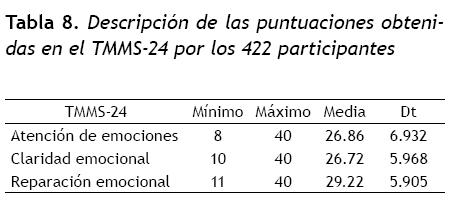
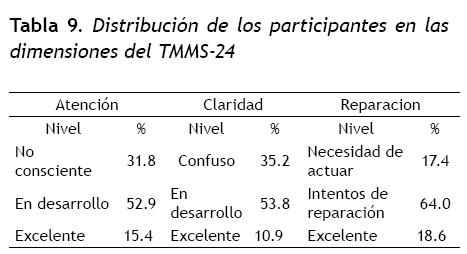
Las dimensiones de la inteligencia emocional presentan asociaciones significativas entre sí; se encontró que la atención a los sentimientos está asociada tanto con la claridad como con la reparación de los mismos (r = .14 Sig.= .004; r = .15 Sig. = .002, respectivamente). De igual manera, la claridad de sentimientos guardó relación con la reparación emocional (r = .31 Sig. = .000), siendo esta asociación la más fuerte.
Al examinar las dimensiones del TMMS-24 por sexo se encontraron diferencias únicamente en la atención a los sentimientos (t(421) = -3.51; Sig. = .000), en la que las mujeres presentan un promedio más elevado (Tabla 10). Mientras que en relación con nivel socio-económico no se encontraron diferencias en ninguna de las dimensiones (Tabla 11).
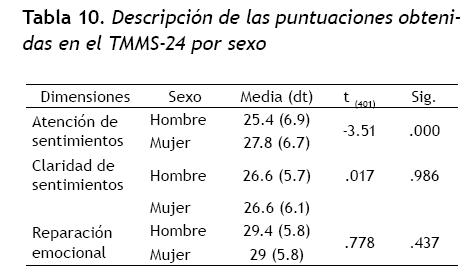

Por otra parte, el número de semestres cursados en el programa académico se encuentra asociado de forma baja, positiva y significativa con la atención de los sentimientos (r = .21 Sig.= .000) y con la reparación emocional (r = .10 Sig.= .032). Igualmente, se encontró una incidencia significativa del número de semestres en la atención de los sentimientos (F(10.411) = 2.19; Sig = .017); encontrándose una marcada diferencia de los estudiantes con un semestre de antigüedad respecto a quienes llevan más semestres cursados en la Universidad (Figura 3).
Discusión
Los resultados obtenidos en la presente investigación reflejan aspectos relevantes respecto a variables que han sido asociadas de forma significativa con el liderazgo; en esta ocasión se estudiaron tales características en una muestra representativa de una facultad de áreas empresariales, en la que se incluyeron estudiantes de todos los semestres académicos con representación similar de ambos sexos de estratos socioeconómicos medio y alto, con edades comprendías entre 16 y 26 años.
Dado que se ha planteado que ciertas características de personalidad, inteligencia emocional y afecto se encuentran asociadas con el liderazgo, el cual en parte, es modulado por procesos de aprendizaje, se decidió estudiar el comportamiento de estas variables en distintos semestres de la formación profesional en áreas empresariales.
Con respecto a la personalidad se utilizó el modelo de los Cinco factores de Costa & McCrae (1992), cuyas dimensiones han sido asociadas al fenómeno del liderazgo. La muestra estudiada presenta promedios ubicados en el rango de normalidad, lo cual es comprensible por el tipo de población estudiada. No obstante, se pudo apreciar la existencia de diferencias estadísticamente significativas respecto a la media poblacional en cuatro de las cinco dimensiones.
En la dimensión Neuroticismo, relacionada con la tendencia a experimentar emociones desagradables y respuestas de afrontamiento al estrés poco adaptativas, los estudiantes de áreas empresariales presentan una tendencia un poco mayor que la población general colombiana, lo cual puede obedecer a factores asociados con el ciclo vital en el que se encuentran, la exigencia académica y demás aspectos relacionados con la formación en general. Los resultados indican que el neuroticismo se incrementa en los tres primeros semestres, retornando a un punto medio en cuarto semestre, se incrementa nuevamente en quinto y a partir de ahí muestra un incremento progresivo hasta el final de la formación profesional. Este fenómeno puede explicarse acudiendo a las fases del proceso académico, en los primeros semestres se presenta la adaptación al ambiente universitario, lo cual conlleva fuertes cargas de estrés, en tal sentido se entiende la disminución en el cuarto semestre momento en el que ya hay mayor adaptación. El incremento de mitad de carrera en adelante puede estar vinculado a los procesos académicos como tal y a su cercanía al ejercicio profesional. Es importante tener en cuenta que en términos generales y tal como ha sido reportado en otros estudios, las mujeres, de manera significativa, presentan un mayor puntaje en neuroticismo, aspecto que puede ser tenido en cuenta para el desarrollo de programas de adaptación a la vida universitaria.
En general, se observa que los estudiantes presentaron una tendencia a incrementar sus niveles de neuroticismo durante la formación profesional, aspecto que resulta negativo para la formación de líderes empresariales, toda vez que inhibe el asumir riesgos (Nicholson et al., 2005).
Cabe aclarar que talves durante la formación, el no asumir riesgos puede ser adaptativo, y no necesariamente estar relacionado con el futuro ejercicio profesional, y en tal sentido, el alto nivel de neuroticismo puede llegar a ser funcional, se sugieren futuros estudios con egresados vinculados laboralmente con el objetivo de verificar este supuesto.
Con respecto a la extraversión, apertura a la experiencia y agradabilidad, se encontró que los participantes puntuaron significativamente por debajo de la media poblacional, aunque dentro de los límites de la normalidad. Este hallazgo reviste especial importancia dado que puntajes altos en estas dimensiones se han asociado con mayor liderazgo empresarial, en cuanto que son personas con mayor confianza en sí mismas y más motivadas a explorar situaciones nuevas, aunque revistan ciertos niveles de riesgos (Nicholson et al., 2005; Gullone & Moore, 2000; Markey et al.,2006) y una sensibilidad particular para analizar la información del ambiente (Mc Elroy & Down, 2007) . Por tal razón, la presencia de puntajes inferiores a la media en estas dimensiones y un puntaje superior a la misma en Neuroticismo hacen indispensable que durante la formación de estudiantes de áreas empresariales se incluyan actividades que favorezcan el fortalecimiento de habilidades sociales, confianza en sí mismos y manejo de situaciones difíciles o generadoras de estrés.
Al examinar la tendencia de dimensiones asociadas positivamente con el liderazgo (E, O, A y C) se pudo apreciar que tanto la apertura a la experiencia (O) como la responsabilidad (C) presentan una tendencia hacia el incremento, aspecto muy favorable para la formación de líderes; mientras que la extraversión (E) y la amabilidad (A), que fluctúan cerca de la media, presentan un descenso importante hacia el final de la carrera, aspecto que debe ser estudiado con el fin de comprender las variables implicadas.
Contrario a lo esperado debido a la tendencia hacia los puntajes altos en Neuroticismo, los participantes presentan una marcada tendencia hacia la emocionalidad positiva, lo cual puede constituir un recurso importante para programas de intervención, puesto que ésta supone una predisposición a experimentar emociones favorables, acompañadas de sensaciones de bienestar, energía, entusiasmo y compromiso con el entorno (Sandín et al., 1999).
El resultado del afecto, positivo o negativo, reflejó ser independiente de las variables demográficas estudiadas (edad, sexo y estrato socio-económico) y pobremente asociado con el número de semestres cursados, lo cual indica que esta dimensión se encuentra vinculada principalmente con variables propias del sujeto y escasamente con los procesos formativos o aspectos situacionales. En tal sentido, los participantes poseen recursos importantes para su formación como líderes, tales como: el optimismo, el cual a su vez se ha relacionado con la persistencia, la resolución adecuada de problemas y la exitosa atención de demandas del ambiente, autodirección y la asunción de riesgos (Carver & Scheier, 2001; Vera-Villaroel & Guerrero, 2003).
Teniendo en cuenta que el temperamento aproximado según Elliot y Thrash (2002), se ve favorecido por una emocionalidad positiva unida a altos niveles de extraversión, los resultados encontrados indican la necesidad de potenciar esta característica de personalidad y mantener la tendencia afectiva con el fin de favorecer la formación de líderes empresariales.
Como cabría esperarse, los niveles altos de afectividad positiva son coherentes con el nivel intermedio de inteligencia emocional encontrado. Aunque las puntuaciones en las tres dimensiones de esta variable presentan niveles intermedios, la reparación emocional (regulación) es significativamente mayor que atención y claridad (comprensión) de sentimientos, este hallazgo tiene importantes implicaciones en cuanto se ha evidenciado que estas personas pueden ser más amistosas y desarrollar una mayor sensibilidad a las relaciones interpersonales y por ende tener comportamientos prosociales (Lopes et al., 2004; Lopes et al., 2005). Asimismo, los individuos que son capaces de manejar sus emociones presentan menores emociones negativas y facilitan las positivas, (Bermúdez et al., 2003; Ciarrochi et al., 2000), lo cual los lleva a que puedan percibir, entender y regular no sólo sus estados emocionales, sino apreciar, entender y tratar los sentimientos y emociones ajenas (Mayer & Salovey, 1997).
Estos resultados son favorables para la formación de líderes, en cuanto a nivel empresarial se ha encontrado que la inteligencia emocional favorece el desarrollo del talento para las negociaciones (Petrides & Furnham, 2000), facilita el control emocional, la automotivación, la empatía, las habilidades comunicativas y la calidad de las relaciones interpersonales (Dulewicz & Higgs, 1998; Lopes et al., 2004); todo ello guarda estrecha relación con un mayor ajuste emocional (Fernández-Berrocal et al., 2001).
Es importante indicar que en este estudio se encontró que hombres y mujeres difieren significativamente en la atención que prestan a sus sentimientos, pero no respecto a la claridad y regulación de los mismos; este hallazgo resulta coherente con algunas teorías sobre las diferencias de sexo en la experiencia emocional, aspecto que debe ser tenido en cuenta en las intervenciones que buscan el fortalecimiento y desarrollo personal de los estudiantes de áreas empresariales; asimismo, este resultado presenta importantes implicaciones para los puntos de corte diferenciados por sexo en todas las dimensiones del instrumento utilizado, puesto que sólo hubo diferencias significativas en una de ellas.
Al examinar la tendencia de las dimensiones de la inteligencia emocional se pudo apreciar un progresivo incremento en todas ellas, con ligeras fluctuaciones de semestre a semestre. En tal sentido, las experiencias particulares unidas a los procesos de formación están favoreciendo el desarrollo de las competencias emocionales en los estudiantes a medida que se van cursando los semestres. Lo anterior refuerza la importancia de incluir en los procesos formativos estrategias que propendan el desarrollo emocional y cognitivo de los estudiantes, generando en ellos mayor confianza en sí mismo, mayor apertura a nuevas experiencias, fortaleciendo sus habilidades sociales y facilitando la expresión de comportamientos prosociales.
Teniendo en cuenta que la inteligencia emocional facilita la expresión de sentimientos y ello a su vez, se encuentra relacionado con el ajuste psicológico (Davies et al., 1998; Fernández- Berrocal et al., 2005; Pennebaker, 1997; Gohm & Clore, 2000), los resultados aquí reportados permiten indicar que los participantes presentan factores protectores frente a la depresión y ansiedad, lo cual vinculado con la tendencia a la afectividad positiva favorece su calidad de vida y adaptación al medio universitario, en cuanto permite reducir la intensidad y frecuencia de emocionalidad negativa, asociados con los eventos adversos de la vida cotidiana (Fernández-Berrocal & Extremera, 2006; Fernández-Berrocal et al., 2008).
Referencias
Avia, M.D. & Sánchez, M.L. (1995). Personalidad: aspectos cognitivos y sociales. Madrid: Pirámide.
Bermúdez, M, P., Álvarez, I. T. & Sánchez, A. (2003). Análisis de la relación entre inteligencia emocional, estabilidad emocional y bienestar psicológico. Universytas Psychologica, 2 (1), 27-32.
Carver, C.S. & Scheier, M.F. (2001). Optimism, Pesimism, and self-regulation. En E.C. Chang (Ed.). Optimism and pessimism. Implications for theory research and practice. (pp. 31-51). Washington, D.C.: American Psychological Association.
Chico, E. & Ferrando, P.J. (2008). Variables cognitivas y afectivas como predictoras de satisfacción en la vida. Psicothema, 20 (3), 408-412.
Ciarrochi, J. V., Chan, A. & Caputi, P. (2000). A critical evaluation of the emotional intelligence construct. Personality and Individual Differences, 28, 539-561.
Contreras, F.V. (2008). Liderazgo: perspectivas de desarrollo e investigación. International Journal of Psychological Research, 1 (2), 64-72.
Costa, P. T. & McCrae, R. R. (1992). Revised NEO Personality Inventory [NEO-PI-R]. and NEO Five-Factor Inventory [NEO-FFI]: professional manual. Odessa, FL: Psychological Assessment Resources.
Costa, P. T. & McCrae, R. R. (1994). The Revised NEO Personality Inventory: Manual Supplement for the Spanish Edition. Odessa, FL: Psychological Assessment Resources.
Davies, M., Stankov, L. & Roberts, R. D. (1998). Emotional intelligence: In search of an lusive construct. Journal of Personality and Social Psychology, 75, 989-1015.
Dulewicz, V. & Higgs, M.J. (1998). Emotional Intelligence: can it be measured reliably and validly using competency data? Competency, 6 (1), 28-37.
Elliot, A. J. & Thrash, T. M. (2002). Approachavoidance motivation in personality: approach and avoidance temperaments and goals. Journal of Personality and Social Psychology, 82 (5), 804-818.
Extremera, N. & Fernández-Berrocal, P. (2005). Perceived emotional intelligence and life satisfaction: Predictive and incremental validity using the Trait Meta-Mood Scale. Personality and Individual Differences, 39, 937-948.
Fernández-Berrocal, P. & Extremera, N. (2006). Emotional intelligence and emotional reactivity and recovery in laboratory context. Psicothema, 18 (supl.), 72-78.
Fernández-Berrocal, P., Extremera, N. & Palomera, R. (2008) Emotional Intelligence as a crucial mental ability on educational context. En A. Valle & J. C. Núñez (Eds.). Handbook of Instructional Resources and their applications in the classroom (pp. 67-88). New York: Nova Science Publishers, Inc.
Fernández-Berrocal, P., Extremera, N. & Ramos, N. (2004). Validity and reliability of the Spanish modified version of the Trait Meta-Mood Scale. Psychological reports, 94, 751-755.
Fernández-Berrocal, P., Ramos, N. & Extremera, N. (2001). Inteligencia emocional, supresión crónica de pensamientos y ajuste psicológico. Boletín de Psicología, 70, 79-95.
Fernández-Berrocal, P., Salovey, P., Vera, A., Extremera, N. & Ramos, N. (2005). Cultural influences on the relation between perceived emotional intelligence and depression. International Review of Social Psychology, 18, 91-107.
Gohm, C. L. & Clore, G. L. (2000). Individual differences in emotional experience: Mapping scales to processes. Personality and Social Psychology Bulletin, 26, 679-697.
Goleman, G. (1995). Emotional Intelligence. Nueva York: Bantam.
Gullone, E. & Moore, S. (2000). Adolescent risktaking and the five-factor model of personality. Journal of Adolescence,23 (4), 393-407.
Johnson, P. R. & Indvik, J. (1999). Organizational benefits of having emotionally intelligent managers and employees. Journal of workplace learning, 11, 84-88.
Lopes, P.N., Brackett, M.A., Nezlek, J.B., Schütz, A., Sellin, I. & Salovey, P. (2004). Emotional intelligence and social interaction. Personality and Social Psychology Bulletin, 30, 1018-1034.
Lopes, P.N., Salovey, P., Cote, S. & Beers, M. (2005). Emotion regulation abilities and the quality of social interaction. Emotion, 5, 113-118.
Malouff, J. M., Thorsteinsson, E. B. & Schutte, N. S. (2006). The five-factor model of personality and smoking: A meta-analysis. Journal of Drug Education, 36, 47-58.
Markey, C. N., Markey, P. M., Ericksen, A. J. & Tinsley, B. J. (2006). Children's behavioral patterns, the five factor model of personality, and risk behaviors. Personality and Individual Differences, 41, 1503-1513.
Martínez-Pons, M. (1997). The relation of emocional intelligence with selected areas of personal functioning. Imagination, Cognition and Personality, 17, 3-13.
Mayer, J. D. & Salovey, P. (1997). What is emotional intelligence? En P. Salovey & D. Sluyter (Eds.). Emotional Development and Emotional Intelligence: Implications for Educators (pp. 3-31). New York: Basic Books.
Mayer, J.D., Salovey, P. & Caruso, D.R. (2004). Emotional Intelligence: Theory, Findings, and implications. Psychological Inquiry, 15 (3), 197-215.
Mc Elroy, T. & Dowd, K. (2007). Susceptibility to anchoring effects: How openness to experience influences responses to anchoring cues. Judgment and Decision Making, 2, 48-53.
Nicholson, N., Fenton-O'Creevy, M., Soane, E. & Willman, P. (2005). Personality and Domain Specific Risk Taking. Journal of Risk Research, 8 (2), 157-176.
Ones, D. S., Dilchert, S., Viswesvaran, C. & Judge, T. A. (2007). In support of personality assessment in organizational settings. Personnel Psychology, 60, 995-1027.
Pennebaker, J. W. (1997). Writing about emotional experiences as a therapeutic process. Psychological Science, 8 (3), 162-166.
Petrides, K. V. & Furnham, A. (2000). Gender differences in measured and self-estimated trait Emotional Intelligence. Sex Roles, 42, 449-461.
Ramos, N. S., Fernández-Berrocal, P. & Extremera, N. (2007). Perceived emotional intelligence facilitates cognitive-emotional processes of adaptation to an acute stressor. Cognition & Emotion, 21 (4), 758-772.
Salovey, P. & Mayer, J. (1990). Emotional Intelligence. Imagination, Cognition and Personality, 9, 185-211.
Salovey, P., Mayer, J., Goldman, S. L., Turvey, C. & Palfai, T. P. (1995). Emotional attention, Clarity, and Repair: Exploring emotional intelligence using the Trait Meta-Mood Scale. En J.W. Pennebaker (Ed.). Emotion, disclosure, & health (pp. 125-154). Washington, D. C.: American Psychological Association.
Sandín, B., Chorot, P., Lostao, L., Joiner, T.E., Santed, M.A. & Valiente, R.M. (1999). Escala PANAS de afecto positivo y negativo: Validación factorial y convergencia transcultural. Psicothema, 11 (1), 37-51.
Vera-Villarroel, P. & Guerrero, A. (2003). Diferencias en habilidades de resolución de problemas sociales en sujetos optimistas y pesimistas. Universitas Psychologica, 2 (1), 21-26.
Watson, D. & Tellegen, A. (1985). Toward a consensual structure of mood. Psychological Bulletin, 98, 219-235.
Watson, D. & Clark, L.A. (1984). Negative affectivity: The disposition to experience aversive emotional states. Psychological Bulletin, 96, 465-490.
Watson, D., Clark, L. A. & Tellegen, A. (1988). Development and validation of brief measures of positive and negative affect: The PANAS scales. Journal of Personality and Social Psychology, 54, 1063-1070.
** Correspondencia: Francoise Contreras, Universidad del Rosario, correo electrónico: [email protected]; [email protected]; [email protected] Dirección postal: Calle 14 No. 6 - 25, Universidad del Rosario, Bogotá, Colombia.
Licencia
Si un artículo es aceptado, los autores/as conservarán sus derechos de autor y garantizarán a la revista el derecho de primera publicación de su obra, en este caso los derechos patrimoniales de publicación y reproducción, en medios impresos y digitales que permitan el acceso público a la obra, mediante la licencia Creative Commons, son del editor.
No obstante, un autor o un tercero pordrá adquirir el permiso de reproducción o adaptación siempre y cuando se de el crédito apropiado, proporcione un enlace a la licencia, e indique si se han realizado cambios
- Los autores/as conservarán sus derechos de autor y garantizarán a la revista el derecho de primera publicación de su obra, el cuál estará simultáneamente sujeto a la Creative Commons Atribución-NoComercial-CompartirIgual 4.0 Internacional (CC BY-NC-SA 4.0)
 , que permite a terceros compartir la obra siempre que se indique su autor y su primera publicación esta revista.
, que permite a terceros compartir la obra siempre que se indique su autor y su primera publicación esta revista. - Los autores/as podrán adoptar otros acuerdos de licencia no exclusiva de distribución de la versión de la obra publicada (p. ej.: depositarla en un archivo telemático institucional o publicarla en un volumen monográfico) siempre que se indique la publicación inicial en esta revista.
- Se permite y recomienda a los autores/as difundir su obra a través de Internet (p. ej.: en archivos telemáticos institucionales o en su página web) después del proceso de publicación, lo cual puede producir intercambios interesantes y aumentar las citas de la obra publicada.


